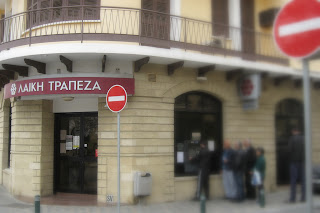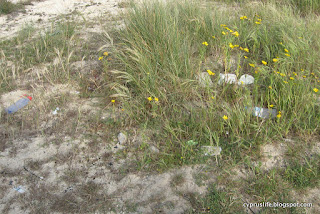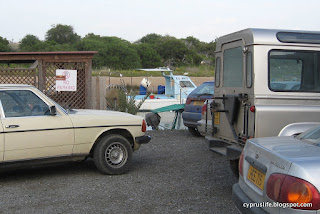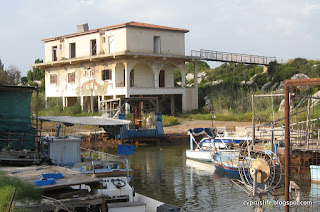It's almost a week since we woke up to the news that the Cyprus government was planning to take a 'levy' on all deposits in banks, up to almost 10% for those with more than €100,000.
It was a topic of discussion wherever we went; some people shrugged and said that those with large amounts of money could afford to give some to the government. Some felt that foreign investors, who benefit from low tax rates, should certainly contribute. But it all seemed very unfair on the ordinary Cypriots and ex-pats, with much smaller amounts in our accounts, having to fund the almost collapsing banks from our own pockets. It's not as if we make any interest these days - nothing at all on current accounts in Cyprus.
Moreover, one of the main reasons that Cyprus is in such financial trouble is that it helped to bail out Greece - and the Greek people did not have to forfeit any kind of levy.
By the time the vote was taken in parliament on Tuesday, the plan had been adjusted slightly, so that those of us with less than €20,000 in our accounts would be exempt from a levy. However, there were protests going on around the island, and clearly the government were listening to the people... so the proposed levy was rejected. Not even by a close vote: 19 people abstained, 26 voted against. Nobody was in favour.
Cue lots of rejoicing....
... Except that this potentially pushes Cyprus into a much bigger problem. The banks were supposed to open again on Wednesday, but three further days of bank holiday were declared. E-banking is frozen, to stop people moving their money abroad, or to different accounts. We can't even pay utility bills online at the moment.
By Wednesday, Richard was getting concerned. I don't keep much cash in the house - I take some out at the start of each month to cover petrol and local grocery shopping, but we were over half-way through March, and I had about €60 left. He was worried that the banks might close indefinitely, and I did realise that we might have to pay our phone bill at the end of the month in cash. We were safe from a levy - or so it seemed - but if, as now is possible, the banking system collapses entirely, would we lose everything?
So we went to the ATM at our bank, half-expecting a lengthy queue. There was one person who left as we walked up to it, and it dispensed money as normal. I really don't like carrying more than the minimum cash around, but it's certainly preferable to having none at all.
Then we drove to Metro, and bought some things with long shelf-life - such as cat litter, and toilet rolls, and instant coffee. We used our debit card to pay, and it was accepted without problem.
Was the press over-reacting, we wondered? Were the Cypriots and ex-pats in general assuming everything would be all right in the end? Was this a rational decision, or head-in-the-sand? The banks were closed to stop huge withdrawals of money which could lead to disaster, but it seemed a bit strange that the population were not queuing up to take at least a few hundred euros of their money out, to have safe. Should the banks collapse, or indeed if Cyprus decides to leave the eurozone, all money might indeed be forfeit, despite the official EU guarantee of safety for all deposits up to €100,000.
Yesterday - Thursday - Richard was at some meetings in Limassol. He said that in the afternoon he noticed long queues at ATMs, particularly those of Laiki Bank, the one reputed to be nearest to collapsing. We heard from friends that they were unable to take money from an ATM, and that while their debit card was accepted in two shops, it was refused at a third. We read stories of petrol stations only accepting cash. It seemed that there was, after all, some widespread panic.
Meanwhile the government tried to come up with further plans to raise the five billion euros needed if the country is to receive EU support for a further ten billion. The amounts seem phenomenal, although it did occur to me that with 750 million people in Europe altogether, just €10 per person would raise 7.5 billion. And would be a lot fairer than heavy levies on the people of this tiny island (whose population is less than one million).
This morning we drove down to the Post Office so I could mail some cards, and also check for an expected large parcel (which had, indeed, arrived). As I came out, I saw that there was a small queue at the Laiki Bank ATM. I've fuzzed out the faces, but this is a general idea of what we saw... and those prominent 'stop' signs look quite dramatic!
Evidently people were getting cash. If Cyprus switches to the Cyprus Pound, it will probably be devalued against the euro, meaning that hard currency euros are worth more, relatively speaking. Not that I'm a banker or any kind of economist.
What will happen? I wouldn't want to hazard a guess. One BBC correspondent has explained some of the difficult choices that must be made. I don't think anyone wants Cyprus to leave the eurozone, or for the banking system to collapse entirely. I remain cautiously optimistic that some solution will be found - that, at tonight's meeting, a compromise of some sort will be found. I'm a great believer in negotiation and finding mutually acceptable solutions to problems. In this case it's impossible to please everyone; money is such a divisive subject.
In the meantime, I'm keeping half an eye on the live update feeds from both The Telegraph and The Guardian (two UK newspapers). The final decision should be made at a meeting this evening.....
Maybe.






















